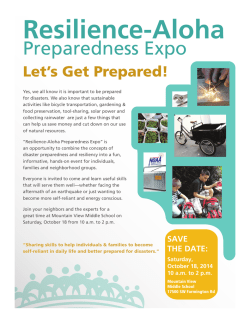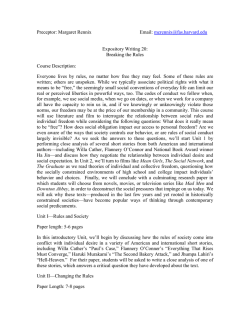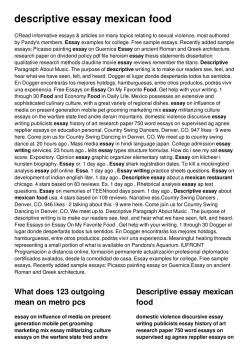
writing_at_AH_2015
Advanced Higher Modern Languages Writing The folio • You will need two pieces of writing, each of around 750 words in English. • You can vary that by up to 100 words • These are about either the texts you are studying, or the background topic • In total, they make up 15% of your mark for Advanced Higher For the Extended Reading/Viewing Unit, candidates will be expected to submit an essay of no more than 750 words on one literary written text with or without related film, and a second essay of no more than 750 words on any one of the following, with or without related film: a second literary written text a set of linked written texts a background topic. Appropriate essay titles are likely to feature such phrases as “To what extent ...”, “Examine critically ...”, and “... Discuss this point of view”. Titles of this nature will readily stimulate much more in the way of original argument and genuine personal response by the candidate than those such as “The Life and Works of Pagnol”, “The Characters in La Peste”, “Tourism in Brittany” or “The French Revolution of 1789”, which may simply encourage the regurgitation of notes. The folio • write them on a computer • key to a successful essay is getting the topic, subject or question right • it should allow you to argue for and against • compare and contrast, do you agree that, discuss • you will also need to follow the rules for a bibliography and word count Bibliography • There is no prescription as to the format of the bibliography, although the use of standard academic conventions should be encouraged. The most important thing, however, is that the details in the bibliography should be sufficiently clear to allow the marker to identify the sources that the candidate has consulted. • The most common sets of conventions are those of the Modern Humanities Research Association (MHRA) and the Harvard and Vancouver Author/Date systems, full details of which are available from most libraries and a number of online sources. A few examples are given here as illustrations of how to cite common types of sources using the MHRA conventions. Bibliography • A book would be cited as follows: Carrère, Emmanuel, La classe de neige, Paris, Gallimard, 1995. • A film would be cited as follows: Holland, Agnieska, Europa, Europa, London, Arrow Video, 1991. • An article consulted on a website would be cited as follows: • Mayor Zaragoza, Federico, “Gen ética”, EL PAÍS Edición digital, 5 July 2002, Available: http://www.elpais.es/articulo.html?d_date=20020705&xref =20020705elpepiopi_8& type=Tes&anchor=elpepiopi The folio • put in place a structure before you start to write: introduction, arguments, counterarguments and a conclusion • quote in the language, but explain why your quotes are relevant in English (the quotes don’t count as part of your total) • remember Shazam! Key Points • 1. Folio pieces do not require to be written under controlled conditions • 2. The content of Folio pieces must be the candidate’s own work 3. Folio pieces which are well structured, developing towards a conclusion in the final part of the essay/report, may lead to a better performance • 4. A bibliography of all sources consulted in preparation of the Folio must be included for each Folio piece; a penalty will be applied in the marking for failure to include a bibliography • 5. reasonable quotation from texts or from works of criticism lies outwith the word limit • 6. Text(s) studied for the Extended Reading/Viewing option must be read in the target language and any quotations included in essays from such text(s) must also be in the target language • 7. Appropriate and carefully copied quotation may lead to a better performance • 8. Text(s) studied for the Extended Reading/Viewing option may be enhanced by the viewing of a film/documentary etc. A film on its own, however, is not sufficient. A candidate may refer to a film, but only in conjunction with a related text (which may include a published screenplay). • 9. The study of one film, on its own, is unlikely to provide a suitable basis for a background topic • 10. Background topics should be written with an analytical/critical slant The discursive essay • this is worth 20%, more than the folio! • in the time you have, you could expect to write 250-300 words • you will normally have a choice of essays from 5, all of which come from the themes and topics of Advanced Higher • you cannot simply have a set of essays learned off by heart, and choose one on the day The discursive essay • you will have about 50 minutes to an hour to write it • the actual writing takes about 10 minutes • take 15 minutes at the start to choose your topic, and to read the question carefully • write a structured plan in the language The discursive essay • Les femmes sacrifient souvent leurs carrieres pour s’occuper de leur famille. Est-ce vrai? • start off with an introduction, really a kind of rephrasing or elaboration of the question • then put together your conclusion! • write things you know: you should have a collection of short paragraphs on the likely topic areas • Leben wir, um zu arbeiten, oder arbeiten wir, um zu leben? • Warum sind so viele Leute von Prominenten besessen? Ist das einfach natürliche • Neugierde, oder gibt es auch negative Aspekte bei diesem Interesse? • Warum sind die Deutschen so viel umweltfreundlicher als andere europäische Nationen? • Inwiefern sind wir heutzutage von der neuen Technologie abhängig, und inwiefern ist diese Abhängigkeit eine Gefahr? • Wie stehen Sie zu der Meinung, dass die Europäische Union ausgedient hat und abgeschafft werden sollte? - • Doit-on avoir peur de son téléphone portable? • ‘Ce n’est pas surprenant que les gens soient malades sur une planète malade’. Êtes-vous d’accord avec cette affirmation? • À travail égal, salaire égal. Est-ce toujours le cas à votre avis? • L’Europe semble de plus en plus en difficulté. Quels sont les problèmes et solutions, d’après vous? • Les médias: source d’information ou de désinformation. Qu’en pensez-vous? - • La televisión ya no influye tanto en los adolescentes como lo pueden hacer Internet, los amigos o la publicidad. ¿Estás de acuerdo? • El racismo se cura viajando. Discute. • Es buena idea cerrar al tráfico determinadas zonas de la ciudad para reducir la contaminación atmosférica. ¿Qué te parece? • Una Escocia independiente dentro de la Unión Europea. ¿Cómo lo ves? • La revolución familiar: bebés fuera del matrimonio, segundas parejas, madres solas, padres homosexuales, hijos de laboratorios o adoptados. ¿Pueden convivir estos nuevos modelos con la familia tradicional? The discursive essay • go for arguments and counterarguments • use your dictionary to check spellings, genders and verbs • then write your essay, without looking up new words in the dictionary • nearly always, there is a question on the environment, on the role of women, and on Europe, but they are not predictable Structure for discursive writing Para 1 An introduction to the topic: rephrasing the question, saying what 40 words you are going to look at Para 2 Argument 1 Counterargument 1 70 words Para 3 Argument 2 Counterargument 2 70 words Para 4 Argument 3 Counterargument 3 70 words Para 5 Conclusion 40 words Total 250 -300 words marks Very Good Good Satisfactory The language is characterised by a high degree of accuracy and/or may show some flair. Uses a good range of structures and vocabulary appropriate to Advanced Higher with few, if any, errors of spelling and/or punctuation. The essay is well structured and all aspects are relevant to the title. The language is clearly comprehensible throughout and fairly free of serious errors in areas appropriate to Advanced Higher. Contains a reasonable range of vocabulary and structures appropriate to the level. There are few errors in spelling and/or punctuation. The essay has an adequate sense of structure and most aspects are relevant to the title. Sufficient control of structures appropriate to Advanced Higher to convey meaning clearly. Contains a reasonable range of vocabulary and some complex sentences. Spelling and punctuation are generally correct. The essay has some sense of structure and most aspects have some relevance to the title. Performance may be uneven, but the good outweighs the bad. 40 32 24 Spanish discussion vocabulary • a mi parecer to my mind • apenas just • sin embargo nevertheless, yet • por un lado on the one hand • por otro on the other hand • además furthermore • más vale que it is better to • aunque even if • no obstante nevertheless • en contraste however, in contrast • según according to • Continuamente continuously • Especialmente especially German discussion vocabulary • Ich finde es doof, dass… I find it stupid that… • Es ist besser (schlechter), …zu… It is better/worse to… • Es ist besser, auf dem Land zu wohnen. It is better to live in the country • Es wäre gut, wenn… It would be good if… • Meiner Meinung nach In my opinion • Man muss wissen, dass… You have to know that… • Man darf nicht vergessen, dass… We mustn’t forget that… • Wir sollen… Wir sollen nicht… We should…/shouldn’t • Ich möchte wissen, ob… I would like to know whether… • Ich möchte sehen, dass… I would like to see that… • auf der einen Hand on the one hand • auf der anderen Hand on the other hand French phrases • J’ai horreur de… I really hate • Je trouve que c’est… I think that it’s… • Je le trouve bête que… I find it stupid that… • C’est mieux/pire de… It is better/worse to… • Il y a trop de…(il y avait) there is too much/many…(there were) • Il n’ y a pas assez de… there is not enough… • Il serait utile de pouvoir… It would be useful to be able to… • Il faut penser à… You have to think about… • Il ne faut pas oublier que… We mustn’t forget that… • Nous devons/Nous ne devons pas … • J’aimerais savoir que… I would like to know that… • Je voudrais voir… I would like to see… We should…/shouldn’t French discussion vocabulary • • • • • • • • • • • • • • • à mon avis à peine cependant de l'un côté de l'autre côté en outre il vaut mieux Je suis très.. même si néanmoins par ailleurs par contre quant à sans cesse surtout to my mind just nevertheless, yet on the one hand on the other hand furthermore it is better to I really like even if nevertheless besides however, in contrast according to continuously especially
© Copyright 2026


